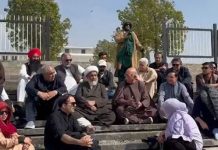By Qamar Bashir
Former Press Secretary to the President
Former Press Minister to the Embassy of Pakistan to France
On Wednesday, January 27, 2023, the caretaker government of Punjab took the oath of office. Its term expires on April 26, 2023, and the supreme court has ordered an election on May 14, 2023. This has raised a significant and difficult question about the legality and constitutionality of the existence of a caretaker government after expiry of its mandated period. The PTI’s legal spokesperson, Ch. Fawad Hussain, has stated that the caretaker government will cease to exist on April 22nd, and any administrative or financial decisions made by it will be illegal and invalid. However, neither the PDM nor the caretaker government have released a narrative on this critical issue. Regardless of any political narrative, this question requires serious consideration and in-depth research because an extension in the date for holding elections, even if validated by the superior judiciary, may or may not imply that the caretaker government’s mandate is automatically extended as well.
The caretaker government is appointed to oversee the country’s administration in the run-up to general elections, with the mandate to ensure free, fair, and transparent elections, as well as to maintain law and order during the electoral process. If elections are not held within the timeframe specified by the constitution, the mandate of the caretaker government should typically end once the new government is elected and takes office. But this does not appear to be so simple, especially given the current political climate, in which no player appears to be in a position to tolerate and dismiss any legal or constitutional hiccup or issue without close scrutiny.
The constitution specifies 90-day and 60-day election periods. According to Article 224 (1), a general election to the National Assembly or a Provincial Assembly must be held within sixty days of the day the Assembly’s term is set to expire. According to Article 224 (2), when the National Assembly or a Provincial Assembly is dissolved, a general election to the Assembly must be held within ninety days of the dissolution, and the results must be declared no later than fourteen days after the polls close. Article 254 does, however, provide a levee if the timeframes stipulated in the constitution cannot be met due to unavoidable circumstances beyond the control of the government or election commission. Article 254 states that when any act or thing is required by the Constitution to be done within a specific period and it is not done within that period, the act or thing is not invalid or otherwise ineffective solely because it was not done within that period. This means that if a legal act or action is not completed within the time frame specified by law, it does not necessarily render the act or action invalid or illegal. In other words, the provision allows for some flexibility in adhering to strict timelines and deadlines, and recognizes that circumstances may arise that make completing an action within the specified time frame difficult or impossible. However, this provision, understandably, does not provide unlimited flexibility or excuse intentional or deliberate violations of timelines or deadlines. The provision only applies in cases where a good-faith effort to comply with the requirements is made, but circumstances beyond one’s control prevent timely completion of the action; therefore, it is critical to ensure that the provision is not abused to justify intentional or deliberate non-compliance with timelines or deadlines.
However, how this provision is applied in the case of the Punjab caretaker government is open to interpretation. With a view to comprehend complexity of the matter there seems to be a need to benchmark best legal and constitutional best practices adopted by relevant organs of the state elsewhere in the world by examining some parallel cases to understand how the extension to the caretaker governments was granted and how actions taken by it were validated. Let us briefly examine the parallel cases of Bangladesh, Nepal and Thailand.
Bangladesh’s national election was held on December 29, 2008, under the Caretaker government formed on January 13, 2007, with Dr. Fakhruddin Ahmed as Chief Adviser. Even after its 120-day mandate expired on May 12, 2007, the Caretaker government continued to function without legislative authority. For the sake of legitimacy, all subsequent decisions were ratified by the parliament.
Due to political deadlock and the failure to hold elections on time in 2013, Nepal’s caretaker government’s term was extended by six months beyond the constitutional limit. The main political parties in Nepal reached a political agreement to extend the caretaker government’s term. The President of Nepal issued a decree to extend the caretaker government’s term, which was later challenged in Nepal’s Supreme Court, which upheld the extension and ruled that it was constitutional in 2014.
Due to political unrest and the inability to hold elections on time in Thailand in 2014, the caretaker government’s term was extended beyond the constitutional limit. The Thai King issued a royal decree extending the caretaker government’s term. The extension was later challenged in Thailand’s Constitutional Court, which ruled in 2015 that it was constitutional, citing the need to maintain peace and order in the country.
When we compare these examples to the possibility of extending the mandated period of the Punjab Caretaker Government, we can see three possible solutions to save the caretaker government during an unvalidated extended period.
One solution is to amend the constitution to allow for election postponement and to extend the current caretaker government’s term until elections are held. Although this is the best possible solution, it necessitates agreement among political parties to pass the resolution with a two-thirds majority, which is nearly impossible when the entire opposition is outside the parliament, the country is gripped by extreme political polarization and division, and parties have taken extreme positions against each other. The second option is for both the ruling and opposition parties to reach an agreement to allow the caretaker government to continue until elections are held and to validate its actions as soon as the constituted assembly convenes. However, due to the extreme political divide and the lack of an effective communication channel between the government and the opposition, this is not possible. In these circumstances, the best solution is to petition Pakistan’s Supreme Court for an extension of the incumbent caretaker government until elections are held and the new government takes office.
One significant challenge while implementing the third solution is to determine who will bell the cat. The Election Commission, which is mandated to hold elections in the country, may seek an extension through a writ petition or application. The attorney general may be the next best choice or any contesting political party that may feel aggrieved for an invalidated extension in the caretaker government may prefer a writ petition to either extend or appoint new caretaker government until the election is held and the new government takes oath.
The validation of an extended period of caretaker government is critical because it ensures the continuity and stability of a country’s democratic process during a transition period. It is also critical that the caretaker government has a clear, defined, and limited timeframe in order to prevent it from extending its term and ensuring that the democratic process runs smoothly. However, in exceptional circumstances where an extension is unavoidable and additional time is required, the extended period must also be validated to avoid uncertainty and instability, which can be detrimental to the democratic process and overall state functioning.
Political parties should have a heart, show some mercy to the people of Pakistan, and for the sake of the country, forego their extended egos, belligerent and aggressive postures, and agree on a formula to resolve this burning issue with consensus in order to keep the democratic process moving forward.

















